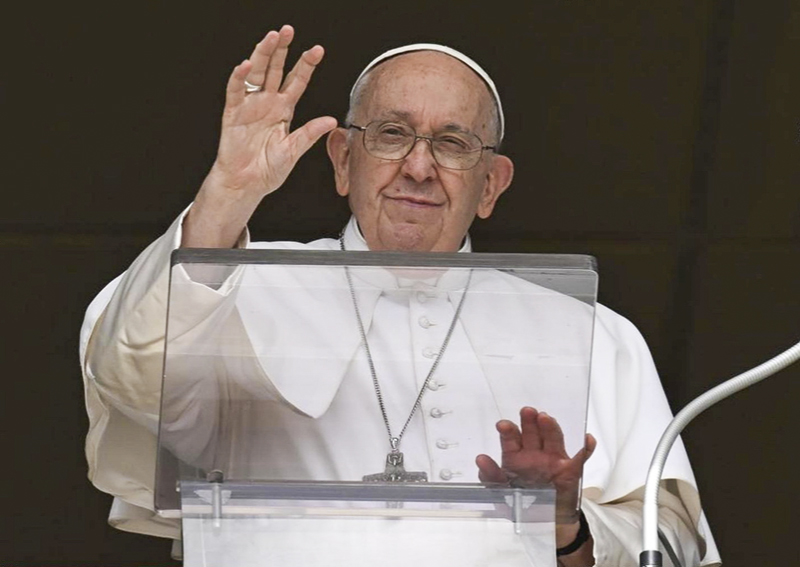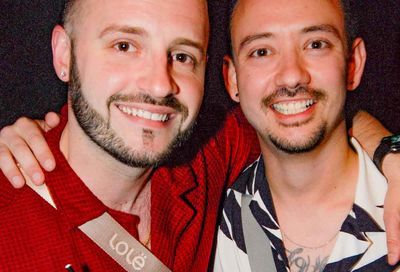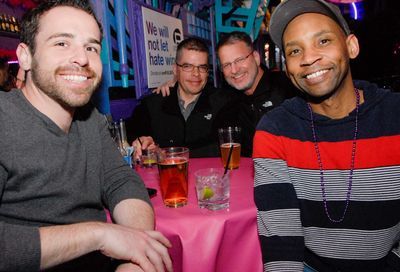Fit to Print?
GLAAD Report Shows Surge in Commitment Ceremony Announcements
Ann Coulter-types who score book deals by condemning the media’s “liberal bias ” might infer affirmation from a recent report from the Gay and Lesbian Alliance Against Defamation (GLAAD).
The Announcing Equality Project, GLAAD’s yearlong endeavor to encourage newspapers to publish announcements of same-sex commitment ceremonies, released its halfway-point results on February 18. Originally, GLAAD’s goal had been to double the number of papers announcing commitment ceremonies within one year. Instead, they reached their goal in one month.
“We hadn’t expected such a domino effect, ” says Michael Young, GLAAD’s Northeastern Regional Media Director who has been working on the project.
The Announcing Equality Project began after the watershed New York Times decision to begin running same-sex commitment ceremony announcements in their weddings section. GLAAD’s efforts include contacting the publishers and editors of newspapers across the country, as well as working with GLBT groups in those communities that the project targets.
When the Times declared its new policy on August 18, 2002, there were 69 U.S. newspapers printing commitment ceremony announcements. GLAAD’s goal of doubling that number was met in just over a month when the Charlotte Observer in North Carolina stated on September 20 that it would become the 138th paper to print the announcements. By February 18, 2003, the number had nearly tripled to 191, with 45 states boasting newspapers with such a policy.
“As couples learn that this option is available to them, they discover a tool that can help them integrate more fully into their community, ” said GLAAD Executive Director Joan M. Garry in a statement, adding that this offers “others a window on their lives and stories that ultimately drives understanding. ”
Young agrees that visibility is a big part of the project’s importance, and also believes that such announcements reaffirm the validity and strength of gay relationships.
Since the project began, many newspaper giants like the Boston Globe and the Los Angeles Times have begun printing commitment ceremony announcements, although some list them in a section separate from traditional weddings. But from the start, the goal of Announcing Equality has been to work with not just big, urban papers, but also smaller community and suburban papers.
“In these smaller communities, everyone often knows what’s going on with everyone anyway, ” says Young. “By printing announcements about the same-sex commitment ceremonies that people have already heard about through the grapevine, it helps make them seem more normal and that’s definitely important. ”
In the D.C. area, various community papers differ in their approaches to the topic. The Times Community Newspapers group, which publishes throughout Northern Virginia, prints commitment ceremony announcements along with its wedding announcements in the classified section. The Journal Newspapers — which include four Northern Virginia and two Maryland editions — have not yet encountered the situation, says Managing Editor Scott McCaffrey.
“No one’s brought them to us yet, ” he says, “but I certainly don’t think there would be objection to it within the company. ”
McCaffrey is also Managing Editor of the Sun Gazette papers of Northern Virginia, which do not print wedding announcements.
The Washington Post will print the announcements for a fee, just as they do for their weddings, but commitment ceremony announcements are placed in a separate section called “Celebrations. ”
While states such as California and Massachusetts ranked high in the number of papers that publish the announcements, many states not normally known for their tolerance also showed favorable results. In Texas, home of the sodomy law currently being debated by the Supreme Court, the number jumped from two newspapers to ten during the past six months. The number of newspapers adopting the policy in Florida, where both gay sex and gay adoption are illegal, increased from four to ten. North Carolina’s number leapt from two to thirteen.
Young’s personal goal is to see the last five states still not on the list — Louisiana, Mississippi, Oklahoma, South Dakota and Wyoming — end up with at least one paper printing the announcements.
And what of liberal bias in the media? With seven states where gay sex is illegal being home to these papers, does this prove that journalists really do have a liberal slant?
“If anything, it’s getting more conservative, ” says Young of the media. “I think publishing these announcements is more about accurately representing events that are happening. Most editors and publishers we talk to seem to get that. ”
Support Metro Weekly’s Journalism
These are challenging times for news organizations. And yet it’s crucial we stay active and provide vital resources and information to both our local readers and the world. So won’t you please take a moment and consider supporting Metro Weekly with a membership? For as little as $5 a month, you can help ensure Metro Weekly magazine and MetroWeekly.com remain free, viable resources as we provide the best, most diverse, culturally-resonant LGBTQ coverage in both the D.C. region and around the world. Memberships come with exclusive perks and discounts, your own personal digital delivery of each week’s magazine (and an archive), access to our Member's Lounge when it launches this fall, and exclusive members-only items like Metro Weekly Membership Mugs and Tote Bags! Check out all our membership levels here and please join us today!























